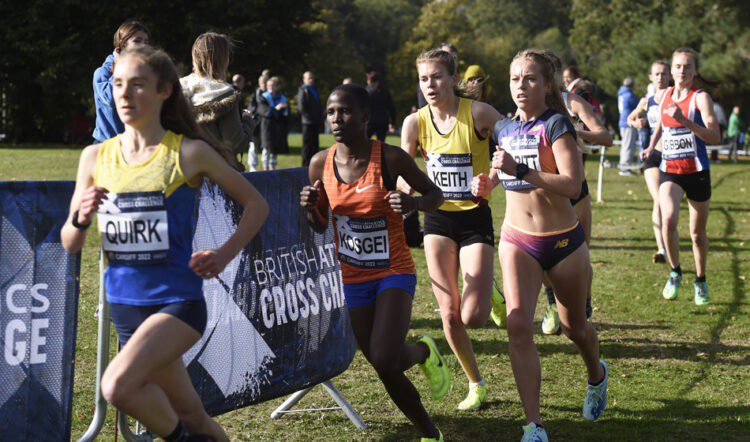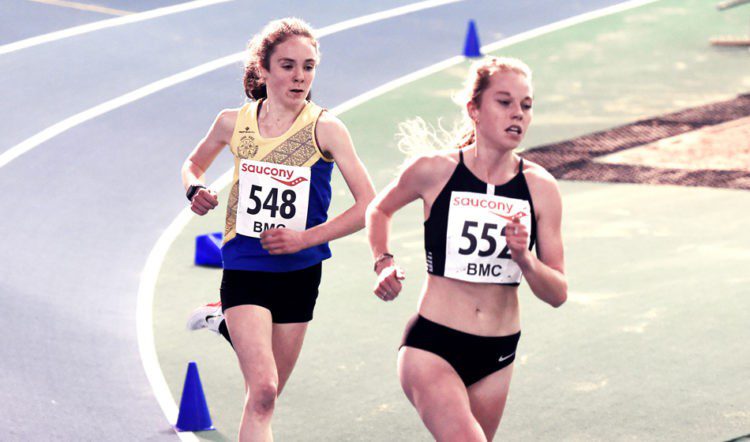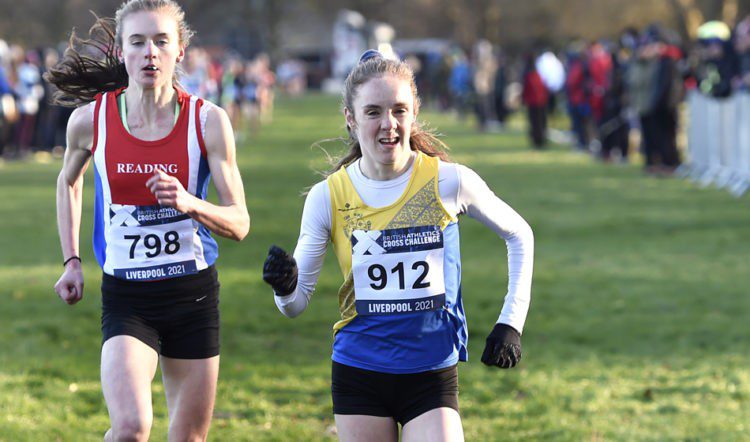
British distance runner is striving to reach her potential at the University of Birmingham
Amelia Quirk is benefiting from the best of both worlds as she thrives within the high performance environment at the University of Birmingham while under the remote guidance of experienced coach Mick Woods.
Having worked with Woods since 2017, Quirk – fifth in the 2021 European Indoor Championships 3000m – admits she has had to improve her communication skills to get the most out of a partnership that has led to GB vests on the track and in cross country. “I’m typically terrible at replying to messages,” she laughs.
On the phone, Woods gathers information, imparts knowledge and delivers sessions over daily calls. On campus, former international steeplechaser Luke Gunn, head of athletics at University of Birmingham, oversees many of her sessions in person.
“I do a decent amount of running on my own, but quite often, especially at the weekend, I join in with the uni group,” says Quirk. “It’s a really big group and pretty similar to what I have at home in the fact that it’s mixed gender and ability.
“We get Birmingham Uni students but also local people based in the area. That’s one of the things I really like about Birmingham – everyone just shows up and joins in and I think that’s really helpful.”
The 23-year-old MRes Sport, Exercise and Rehabilitation Sciences student showed fine form at the start of the winter. She clocked the fastest leg at the ERRA National Road Relays in early October and finished first Brit at the Cardiff Cross Challenge.

Amelia Quirk leads Pamela Kosgei (Mark Shearman)
Injury followed, leading her to miss the Euro Cross trials in Liverpool, but she is due to return to racing this weekend (Jan 8) representing England in the Juan Muguerza Cross-Country Race in Elgoibar, Spain.
Her naturally shy demeanour certainly doesn’t lend itself to trash talk or excessive self-confidence. In fact, while others may revel in the atmosphere of a boisterous cross country event, Quirk – in the past at least – admits that she’s had a tendency to panic. “I don’t like crowds or loud noises, so I find it really stressful,” she says.
A benefit of the University’s “Elite Dual Career Athlete Pathway”, and one of the reasons she chose to study in Birmingham, is access to an outstanding programme of practical support which enables her to get the best out of herself physically and mentally.
“I’ve really bought into sports psychology in the past year,” she says. “I knew it was something I needed to work on, but initially I was very sceptical about it. Our sports psychologist Sue Jones is brilliant. She’s really good at giving us practical things to work on, so we do a lot about managing racing environments.
“For example, when I was doing a treadmill tempo she sent a playlist with horrible crowd noises to the physiologist who just randomly played them to me. Because my heart rate and lactate were being measured, we could see there was no effect on my physiology which was good. It showed me that I could work through it and it’s teaching me that the crowd noise isn’t a threat to me.”
University of Birmingham coaches put together an outline training plan for the month which they share with athletes’ personal coaches. “Mick will look through that and say, ‘Yep, we’ll do that session’ or ‘We’ll do that but miss this rep or do this or that instead’,” explains Quirk. “Even the athletes that are coached by the university coaches, they’ll have sessions that are tailored to them because they’re doing different events, too.”

Jenny Nesbitt leads Amelia Quirk (Mark Shearman)
Typical training week in early winter
Monday: (am) tempo session, either long reps on the road or on the treadmill in the physiology lap. “Staying in the right zone is not one of my strengths, so I get my blood lactate taken to make sure I’m actually doing tempo,” she says; (pm) drills/strides or quicker sprints on the track depending on time of year (with the university group). “Sometimes I do hurdle mobility with the uni group, too,” she adds. “Luke usually leads that – he provides good input for technical running and all the form drills. I find it quite useful to keep in touch with my speed and technique.”
Tuesday: easy run (usually 60min) then strength and conditioning (S&C).
Wednesday: (am) time-based session on the grass with varied rep lengths – for example, 6min, 4 x 3min, 6min, 4 x 90sec (all with 90sec jog recovery); (pm) easy 30min spin.
Thursday: as Tuesday.
Friday: rest (unless race weekend in which case it would be 20min & strides) and lower limb/injury prevention foot drills.
Saturday: session with the university group (if not racing) – for example, two sets of 9min, 6min, 3min (60sec recovery) or three sets of 6min, 6 x 30sec hills, or 1600m (400m jog), 3 x 1km (200m jog), 3 x 400m (200m jog) on the track.
Sunday: long run (80-90min).
Quirk admits that the inclusion of drills and S&C exercises (with S&C coach Simon Eustace), specifically to address any areas of weakness, have been a valuable addition to her training programme since starting university.
She supports her training with regular physiotherapy with Mike Gosling (Physiokinetic).

Amelia Quirk (Mark Shearman)
Favourite session
“I can’t give a specific one because I’m pretty sure I’ve never done the same grass session twice. Mick’s always tweaking it slightly! I love that there’s always a mixture of rep lengths, especially when the reps get shorter towards the end of a session,” she says. “When I’m back at home [in Berkshire] I love a long run, especially in the Swinley Forest.”
Least favourite session
“I can’t think of any session that I don’t enjoy. I don’t like rest days, but I know how important they are.”
» This article first appeared in the November issue of AW magazine
» Subscribe to AW magazine here
How they train: Amelia Quirk appeared first on AW.


















You must be logged in to post a comment Login